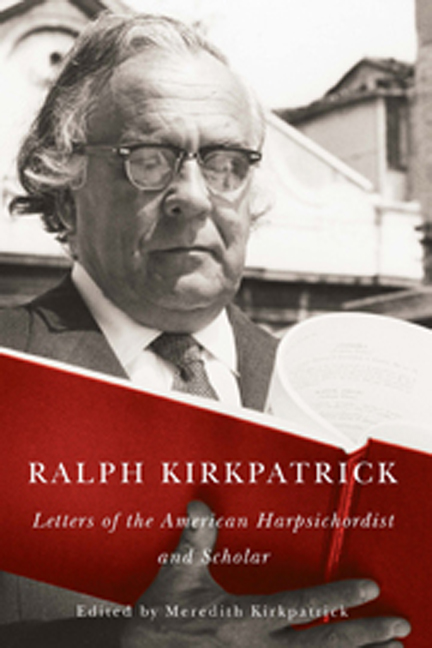Book contents
- Frontmatter
- CONTENTS
- Foreword: “The Glowing of Such Fire”—A Tribute to Ralph Kirkpatrick
- Acknowledgments
- Introduction
- Part One Family
- Part Two Friends, Colleagues, and Other Correspondence
- 2 Nadia Boulanger
- 3 Alexander Mackay-Smith
- 4 Wanda Landowska
- 5 John Challis
- 6 Serge Koussevitzky
- 7 Oliver Strunk
- 8 Roger Sessions
- 9 Harold Spivacke
- 10 Steinway & Sons
- 11 New York Times
- 12 Elizabeth Sprague Coolidge
- 13 John Kirkpatrick
- 14 Alexander Schneider
- 15 Otto Luening
- 16 Donald Boalch
- 17 John Hamilton
- 18 Thornton Wilder
- 19 Lincoln Kirstein
- 20 Arthur Mendel
- 21 Edward Steuremann
- 22 Frank Martin
- 23 Olin Downes
- 24 Albert Fuller
- 25 Elliott Carter
- 26 Quincy Porter
- 27 Vincent Persichetti
- 28 Henry Cowell
- 29 Mel Powell
- 30 Bengt Hambraeus
- 31 Alec Hodson
- 32 Paul Fromm
- 33 Wolfgang Zuckermann
- 34 Kenneth Gilbert
- 35 Mr. and Mrs. George Young
- 36 Colin Tilney
- 37 Oliver Daniel
- 38 Eliot Fisk
- 39 Wilton Dillon
- 40 William Dowd
- 41 Meredith Kirkpatrick
- Afterword: Lessons with Kirkpatrick
- Appendixes
31 - Alec Hodson
from Part Two - Friends, Colleagues, and Other Correspondence
Published online by Cambridge University Press: 05 December 2014
- Frontmatter
- CONTENTS
- Foreword: “The Glowing of Such Fire”—A Tribute to Ralph Kirkpatrick
- Acknowledgments
- Introduction
- Part One Family
- Part Two Friends, Colleagues, and Other Correspondence
- 2 Nadia Boulanger
- 3 Alexander Mackay-Smith
- 4 Wanda Landowska
- 5 John Challis
- 6 Serge Koussevitzky
- 7 Oliver Strunk
- 8 Roger Sessions
- 9 Harold Spivacke
- 10 Steinway & Sons
- 11 New York Times
- 12 Elizabeth Sprague Coolidge
- 13 John Kirkpatrick
- 14 Alexander Schneider
- 15 Otto Luening
- 16 Donald Boalch
- 17 John Hamilton
- 18 Thornton Wilder
- 19 Lincoln Kirstein
- 20 Arthur Mendel
- 21 Edward Steuremann
- 22 Frank Martin
- 23 Olin Downes
- 24 Albert Fuller
- 25 Elliott Carter
- 26 Quincy Porter
- 27 Vincent Persichetti
- 28 Henry Cowell
- 29 Mel Powell
- 30 Bengt Hambraeus
- 31 Alec Hodson
- 32 Paul Fromm
- 33 Wolfgang Zuckermann
- 34 Kenneth Gilbert
- 35 Mr. and Mrs. George Young
- 36 Colin Tilney
- 37 Oliver Daniel
- 38 Eliot Fisk
- 39 Wilton Dillon
- 40 William Dowd
- 41 Meredith Kirkpatrick
- Afterword: Lessons with Kirkpatrick
- Appendixes
Summary
Alec Hodson (1900–1986) was a British harpsichord and virginal maker. He maintained a workshop for forty years before retiring from the profession in the 1960s. He was coauthor of an article in The Musical Times (May 1947) titled “Defining the Virginal.” Apparently, he wrote a letter to RK asking whether he could quote statements RK made at a Royal Musical Association meeting.
March 18, 1961
Dear Mr. Hodson:
Your letter of October 24 has remained shamefully unanswered through a winter of almost constant travel on my part, and I hasten at this late date to undertake to make amends.
You have my willing permission to quote anything I said at the RMA meeting as long as the source is indicated, and I am perfectly willing to be quoted in the following statement: The harpsichord with two manuals, eight-foot and four-foot on the lower and eight-foot on the upper, with one or two buff-stops, represents the most normal disposition for which the greatest composers of classical harpsichord music have written. This disposition properly carried out is adequate for the performances of nearly all harpsichord literature. I applaud those modern harpsichord makers who build instruments in this Ruckers, Blanchet, Taskin tradition and who have the courage to avoid cheapening of construction and foreshortening of basses.
All best wishes,
Sincerely,
Ralph Kirkpatrick
- Type
- Chapter
- Information
- Ralph KirkpatrickLetters of the American Harpsichordist and Scholar, pp. 131Publisher: Boydell & BrewerPrint publication year: 2014



